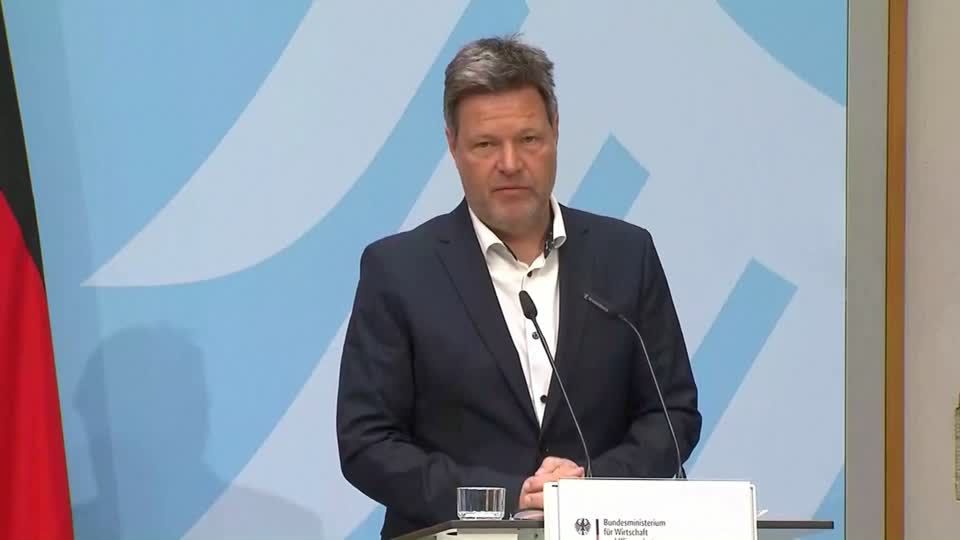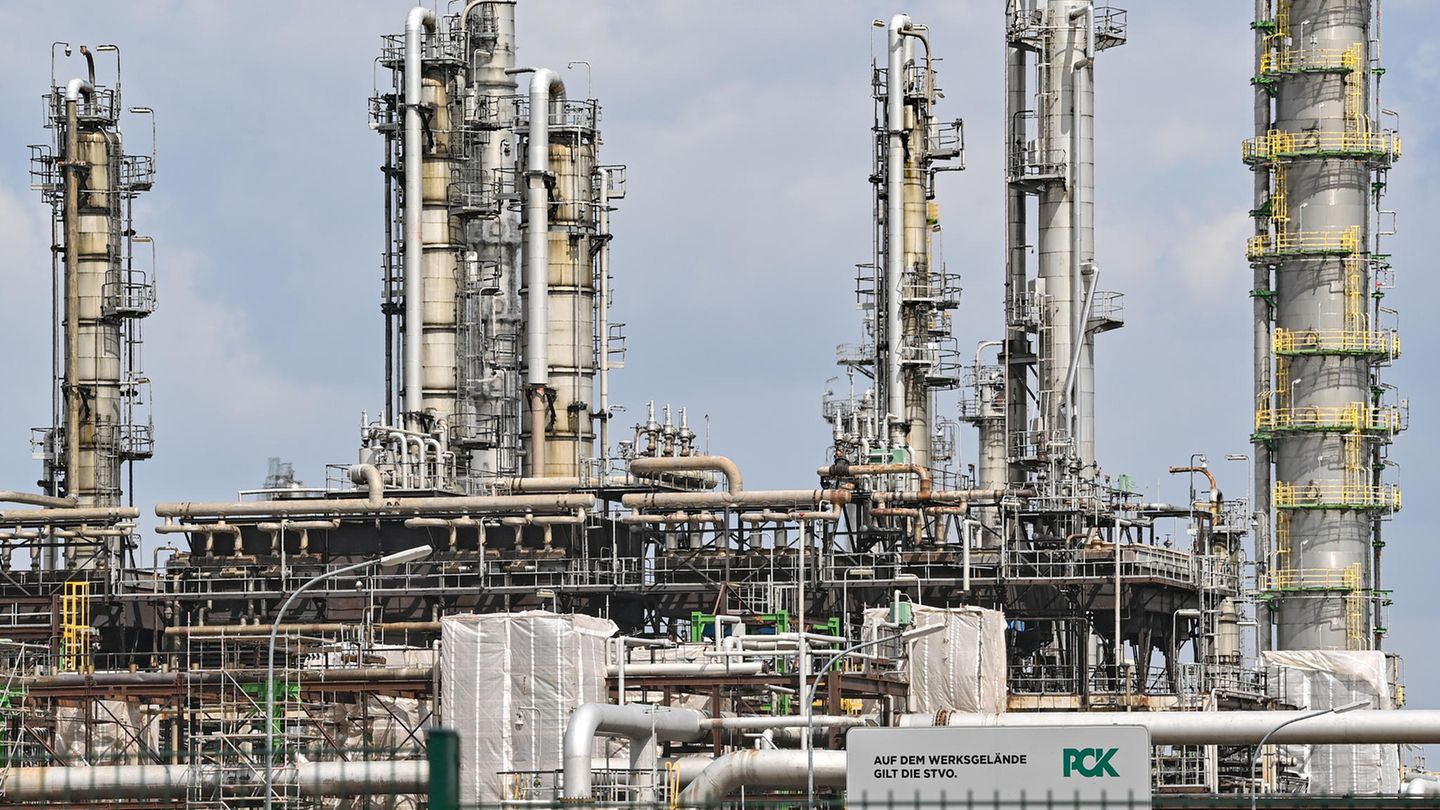questions and answers
At least when it comes to oil, the EU now wants to cut supplies from Russia as soon as possible. In the meantime, Germany could probably cope with such an embargo. However, there is a very specific problem.
It’s going downhill fast. The share of Russian oil in German oil consumption has fallen from 35 to 12 percent within a few weeks – this was stated by Economics Minister Robert Habeck on Sunday in the new progress report on energy security. Now the Green politician also considers an oil embargo against Moscow because of the attack on Ukraine to be feasible, even if it “would not leave the German economy unscathed,” said Habeck. In concrete terms, one particularly high hurdle remains when it comes to the embargo: the operation of the important refinery in Schwedt, which supplies large parts of eastern Germany. And the fear of another price shock for consumers and industry remains.
Will the EU decide on an oil embargo against Russia?
It looks very much like it. After the atrocities in Ukrainian places like Bucha, the pressure on critical member states has increased. Even the German government, which had been reluctant for a long time, is now supporting plans for an import ban on Russian oil, as Foreign Minister Annalena Baerbock confirmed on Sunday evening on “Anne Will”. However, Hungary, Austria and Slovakia, which are themselves very dependent on Russian oil, as well as Spain, Italy and Greece, which fear a further increase in energy prices, were still considered to be slowing things down. Today the energy ministers of the EU countries are meeting on the subject.
When could the oil embargo come?
According to DPA information, the EU Commission, led by Ursula von der Leyen, wants to present the draft for a new, sixth package of sanctions against Russia as soon as possible. It is considered very likely that an oil embargo will be part of it. Possible transition periods are open. Since so many states still have concerns, the proposal could be to allow imports of Russian oil until autumn or even into winter. A conceivable alternative to the import ban is the EU’s upper price limit for oil from Russia in order to cap its income. According to estimates by the Bruegel think tank, Russian oil worth around 450 million euros was recently imported into the EU every day.
How dependent is Germany on Russian oil?
Of the German oil imports from Russia – according to Habeck, 35 percent of consumption in 2021 – so far about one third came by ship to West Germany and two thirds via the Druzhba pipeline to the refineries in Leuna in Saxony-Anhalt and Schwedt in Brandenburg . The purchasers in the West were looking for new suppliers, says Habeck. The Leuna operator Totalenergies also wants to replace Russian oil by the end of the year – if necessary faster, as the minister explains in a video message: “So the problem has been solved.” The remaining share of Russian oil of twelve percent is accounted for by Schwedt. “The last third is the real problem,” says Habeck.
Why isn’t Schwedt looking for new suppliers?
The PCK refinery is operated by the Russian state-owned company Rosneft. “And of course they have no interest whatsoever in not refining Russian oil,” says Habeck. “If I call them and say: ‘Hello, what do you actually want to do to become independent of Russian oil?’ They don’t even pick up the phone.” The federal government is therefore considering expropriation as a last resort. The basis should be an amendment to the Energy Security Act, which could be decided by mid-May. Habeck seems to be assuming that Rosneft will be able to clear the hurdle relatively quickly: “Ending dependence on Russian crude oil imports by late summer is realistic.”
How would Leuna and Schwedt then be supplied in the future?
“From a technical point of view, an alternative supply of the Schwedt refinery via the ports of Rostock and Gdansk would be possible,” says the energy security report. A pipeline for tanker oil from Rostock could cover 60 percent of Schwedt’s needs, with an extension possibly up to 90 percent, writes energy expert Steffen Bukold in a study for Greenpeace. Mecklenburg-Western Pomerania’s Economics Minister Reinhard Meyer (SPD) actually sees opportunities to route more oil from Rostock to Schwedt. However, there are many detailed questions to be clarified.
In addition, deliveries from the port of Gdansk via the so-called Plock pipeline would have to be added for Schwedt, as the economist Jens Südekum from the University of Düsseldorf says. This is also a new reference route for Leuna. But one thing is clear to Südekum: “Replacement for Russian oil is only available at higher prices.”
Do consumers have to dig even deeper into their pockets?
Probably yes. According to Südekum, due to a lack of demand since the beginning of the war, Russian crude oil has been significantly cheaper than oil from other sources, which many now want. Since East Germany in particular has depended on Russian oil so far, large quantities have to be replaced there at higher prices. This is likely to affect consumers in the region. In Berlin, Brandenburg and Mecklenburg-Western Pomerania, nine out of ten cars are currently running on fuel from Schwedt. Leuna supplies around 1300 gas stations in Saxony-Anhalt, Saxony and Thuringia.
Two other cost factors threaten: The plants in Leuna and Schwedt may have to be readjusted if other types of oil are used instead of Siberian oil. And maybe refineries in the west have to contribute to the supply of east Germany, as Bukold writes in the Greenpeace study. That would mean transporting fuel or heating oil by truck or train – it would mean effort and costs.
Are jobs at risk?
In Schwedt in particular, there is great uncertainty. 1200 people are employed directly in the factory, as well as hundreds of employees at suppliers and service providers on the site. She too has more questions than answers at the moment, says Mayor Annekathrin Hoppe (independent). In a letter she warned Habeck to be careful. “We currently feel that the Federal Ministry of Economics doesn’t take us too far,” criticizes Hoppe.
In addition to the question of expropriation, a lot depends on whether enough oil would come from new sources to fill the refinery’s capacity. Südekum considers it conceivable that a difference will remain. There are similar concerns in Leuna. Christof Günther – Managing Director of Infraleuna, which operates the infrastructure in Leuna – said in March that a 100 percent replacement would not be possible. Suppliers could suffer. Around 100 companies with 12,000 employees work at the Leuna chemical site.

Can Germany cope with an oil embargo against Russia?
According to economists, an abrupt halt to oil imports could temporarily drastically increase prices on the world market and slow down the economy in Germany. Transitional periods would probably mitigate the effect of an embargo. Habeck puts it this way: “It would certainly lead to regional bottlenecks, it would certainly lead to higher prices, there would also possibly be local disruptions. So you can’t say nobody notices. But it would no longer lead to a full-blown catastrophe .”
Source: Stern
Jane Stock is a technology author, who has written for 24 Hours World. She writes about the latest in technology news and trends, and is always on the lookout for new and innovative ways to improve his audience’s experience.




